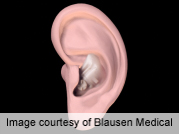
WEDNESDAY, Feb. 15 (HealthDay News) — About 27 million Americans aged 50 and older have lost some of their hearing and could benefit from a hearing aid, a new study finds.
However, many people don’t get hearing aids because they’re often not covered by insurance, they don’t receive training in integrating hearing aids into their daily lives, or they consider hearing loss an inevitable part of aging and not a major concern, according to the researchers.
“There’s still a perception among the public and many medical professionals that hearing loss is an inconsequential part of the aging process and you can’t do anything about it,” said study senior author Dr. Frank Lin, an assistant professor at the Johns Hopkins University School of Medicine and the Bloomberg School of Public Health, in a university news release. “We want to turn that idea around.”
The study is published online Feb. 13 in the Archives of Internal Medicine.
The researchers examined information on hearing aid use and hearing testing among participants of the U.S. National Health and Nutrition Examination Surveys conducted between 1999 and 2006.
About 14 percent of people aged 50 and older use hearing aids. That ranged from 4 percent of 50- to 59-year-olds to 22 percent of people aged 80 and older.
Although more people used hearing aids as they got older, the study’s authors suggested 23 million more people could benefit from hearing aids if they used them.
“Understanding current rates of hearing loss treatment is important, as evidence is beginning to surface that hearing loss is associated with poorer cognitive functioning and the risk of dementia,” Lin said. “Previous studies that have attempted to estimate hearing-aid use have relied on industry marketing data or focused on specific groups that don’t represent a true sample of the United States population.”
More information
The U.S. National Institutes of Health provides more information on hearing aids.

